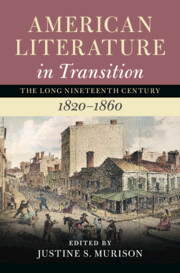Book contents
- American Literature in Transition, 1820–1860
- Nineteenth-Century American Literature in Transition
- American Literature in Transition, 1820–1860
- Copyright page
- Contents
- Figures
- Contributors
- Series Preface
- Acknowledgments
- Chapter 1 Introduction
- Part I Fractures and Continuities
- Part II Forms and Formats
- Part III Authors and Figures
- Chapter 17 Apess/Sedgwick
- Chapter 18 Child/Thoreau
- Chapter 19 Douglass/Walker
- Chapter 20 Emerson/Poe
- Chapter 21 Fuller/Stowe
- Chapter 22 Hawthorne/Winthrop
- Chapter 23 Melville/Whitman
- Chapter 24 Harper/Stewart
- Index
Chapter 17 - Apess/Sedgwick
from Part III - Authors and Figures
Published online by Cambridge University Press: 09 June 2022
- American Literature in Transition, 1820–1860
- Nineteenth-Century American Literature in Transition
- American Literature in Transition, 1820–1860
- Copyright page
- Contents
- Figures
- Contributors
- Series Preface
- Acknowledgments
- Chapter 1 Introduction
- Part I Fractures and Continuities
- Part II Forms and Formats
- Part III Authors and Figures
- Chapter 17 Apess/Sedgwick
- Chapter 18 Child/Thoreau
- Chapter 19 Douglass/Walker
- Chapter 20 Emerson/Poe
- Chapter 21 Fuller/Stowe
- Chapter 22 Hawthorne/Winthrop
- Chapter 23 Melville/Whitman
- Chapter 24 Harper/Stewart
- Index
Summary
This essay places the life and writings of Catharine Maria Sedgwick beside those of her contemporary, the Pequot preacher and author William Apess. Sedgwick’s novel Hope Leslie, or Early Times in the Massachusetts and many of her other writings reinforced the myth of the “vanishing Indian,” and yet native communities persisted in New England in Sedgwick’s own time. By reading Sedgwick and Apess alongside one another, this essay explores white historical fiction’s role in perpetuating settler colonial ideology and highlights Apess’s strategies of rhetorical and literary resistance. In his autobiography, his collection of native conversion narratives, his published sermons, and his political writings, Apess consistently recognized, embraced, and proclaimed not only his own worth as a native man but the survival and sovereignty of native New England communities both past and present.
- Type
- Chapter
- Information
- American Literature in Transition, 1820–1860 , pp. 287 - 302Publisher: Cambridge University PressPrint publication year: 2022

